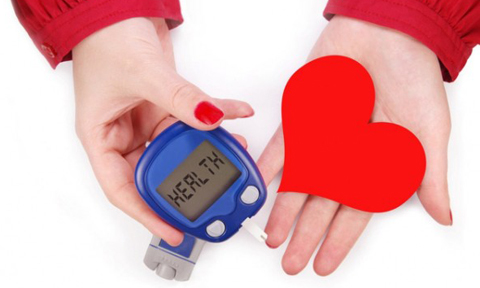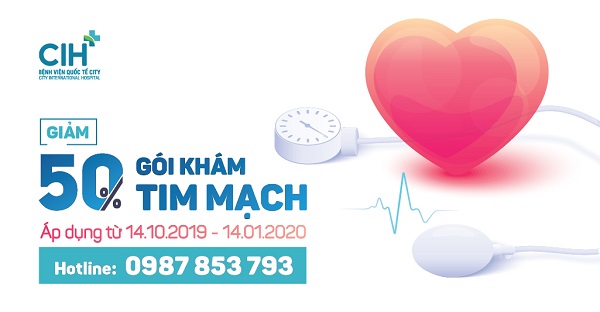Among the complications caused by diabetes, cardiovascular complications are the most common. The cause of death due to cardiovascular causes accounts for up to 70% in patients with diabetes. Therefore, understanding the characteristics of the pathology as well as the clinical manifestations of cardiovascular complications will contribute to preventing and limiting the progression of cardiovascular disease in patients with diabetes.
Risk factors for cardiovascular complications in patients with diabetes
These factors when combined with diabetes will increase the risk of cardiovascular complications many times. The more factors combined, the greater the incidence of cardiovascular complications. These factors include:
- Advanced age (≥60 years; the older, the risk increases).
- Hypertension
- Blood lipid disorders (hypercholesterolemia; hypertriglyceridemia or a combination).
- Obesity (especially abdominal obesity)
- Addiction to waterpipe tobacco or tobacco
- Sedentary lifestyle
- A family history of death from a heart attack.
2 factors can not be affected. It is advanced age and family history; The rest of the factors are subject to change. Therefore, when treating diabetes, never neglect the impact on these risk factors, especially smoking habits, sedentary.

cardiovascular complications are the most common in patients with diabetes.
The main symptom of cardiovascular disease in patients with diabetes
Coronary artery disease: This is the main cause of cardiovascular disease death in patients with diabetes. A very important feature to always emphasize, is the poor clinical presentation of coronary artery disease in diabetic patients. Many patients with myocardial ischemia, even severe myocardial infarction without even knowing it, only when they go to the health examination to come across. Because of this, patients with diabetes must regularly have a cardiac exam to detect the early signs of myocardial ischemia.
However, there are also many patients who have clinical manifestations of angina pectoris (angina pectoris, pain that feels like suffocating the heart, spreading to the left shoulder, chin or left arm); or feeling of severe left chest pressure, palpitations palpitations, shortness of breath ...
Before all abnormal signs, even very small, patients also need a thorough cardiovascular examination to promptly detect and manage early. The patient may be assigned to perform necessary tests to diagnose coronary heart disease such as resting ECG recording, 24-hour continuous ECG by Holter method; echocardiography, exertional test, myocardial perfusion radiography and coronary angiography using a multi-array CT (64; 128; 256 or 320 slices). When myocardial ischemia is suspected, the patient will have a coronary angiogram on Angiography digital angiography to detect coronary artery disease and dilatation, with a support if indicated.
Cerebral vascular disease: Mainly experiencing a stroke (or stroke) manifested by cerebral infarction or cerebral hemorrhage. Clinical manifestations of sudden palsy or paralysis, distortion of the mouth, can be accompanied by varying degrees of consciousness disorder. Clinical manifestations may also be transient and then disappear, then may recur or severe development, may also be severe from the outset leaving sequelae of disability or death. The early manifestations of cerebrovascular disease can be manifested by signs such as mild dizziness, imbalance, sleep disorders, memory loss. At this time, perform cerebrovascular screening tests such as transcranial Doppler ultrasound, cerebral hemorrhage ... can detect signs of cerebral circulatory insufficiency. When the clinical manifestations are localized with neurological signs (polio or paralysis of the limb), the patient should have a CT scan (a CT scan of the brain) to diagnose whether the injury is cerebral infarction or bleeding. blood brain to have appropriate treatments.
Peripheral vascular disease: Early manifestations of peripheral vascular lesions are signs of "walking back and forth", meaning that the person experiences pain, leg pain, or cramping while walking; After resting, the symptoms go away and the patient can continue walking until the symptoms appear again. At first, the walking distance is long, after that the patient will see this distance shortened gradually. There are also other signs such as cramps, ulcers or head necrosis; palpation of the arteries may be absent or weak; vascular loss, low blood pressure in the lower ... Vascular Doppler ultrasound examination will detect large vascular lesions of the limb, or angiography with a CT array or Angio machine to detect in time Damage arteries and take appropriate treatment.
Treatment of cardiovascular complications in patients with diabetes
Must control blood sugar well as recommended by the Vietnam Association of Endocrine Diabetes: based on the results of fasting blood sugar test and HbA1C concentration. Depending on the age and condition combined; In general, ensure fasting blood sugar ≤7.0-7.5 mmol / l and HbA1C ≤6.5-7%. This is a key issue, if not well controlled blood glucose, will not be able to control the complications of diabetes.
Comprehensive treatment not only treats complications such as coronary artery disease or cerebrovascular disease but must be combined with the handling of associated risk factors, especially hypertension, smoking and lipid disorders blood.
Monitor regularly and periodically, promptly detect complications for early and thorough management
City International Hospital offers a 50% Discount Program for cardiovascular consultation
|
50% Discount program on your first cardiovascular visit and consultation
City International Hospital
- Address: No. 3, 17A Street, Binh Tri Dong B Ward, Binh Tan Dist. (Next to AEON Mall Binh Tan). Ho Chi Minh City.
- Operator: (+8428) 6280 3333, ext. 0
- 24/7 Emergency: (+8428) 6290 1155
- Website: https://cih.com.vn/en/
- Fan page: https://www.facebook.com/BenhVienQuocTeCity/
- Email: This email address is being protected from spambots. You need JavaScript enabled to view it.











